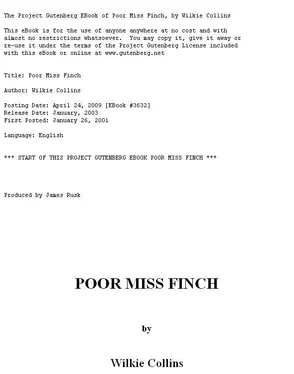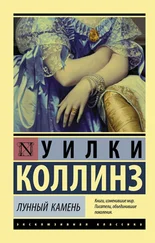Уилки Коллинз - Poor Miss Finch
Здесь есть возможность читать онлайн «Уилки Коллинз - Poor Miss Finch» весь текст электронной книги совершенно бесплатно (целиком полную версию без сокращений). В некоторых случаях можно слушать аудио, скачать через торрент в формате fb2 и присутствует краткое содержание. Год выпуска: 2002, Жанр: Классическая проза, на английском языке. Описание произведения, (предисловие) а так же отзывы посетителей доступны на портале библиотеки ЛибКат.
- Название:Poor Miss Finch
- Автор:
- Жанр:
- Год:2002
- ISBN:нет данных
- Рейтинг книги:3 / 5. Голосов: 1
-
Избранное:Добавить в избранное
- Отзывы:
-
Ваша оценка:
- 60
- 1
- 2
- 3
- 4
- 5
Poor Miss Finch: краткое содержание, описание и аннотация
Предлагаем к чтению аннотацию, описание, краткое содержание или предисловие (зависит от того, что написал сам автор книги «Poor Miss Finch»). Если вы не нашли необходимую информацию о книге — напишите в комментариях, мы постараемся отыскать её.
Poor Miss Finch — читать онлайн бесплатно полную книгу (весь текст) целиком
Ниже представлен текст книги, разбитый по страницам. Система сохранения места последней прочитанной страницы, позволяет с удобством читать онлайн бесплатно книгу «Poor Miss Finch», без необходимости каждый раз заново искать на чём Вы остановились. Поставьте закладку, и сможете в любой момент перейти на страницу, на которой закончили чтение.
Интервал:
Закладка:
She held up a smart ivory walking-cane, with a bright silk tassel attached. With her cane in one hand, and her chemical bottle in the other—and her roguish little hat on the top of her head—she made the quaintest and prettiest picture I had seen for many a long day. " You shall guide me , my dear," I said—and took her arm. We went on down the village.
Nothing in the least like a mysterious figure passed us in the twilight. The few scattered laboring people, whom I had already seen, I saw again—and that was all. Lucilla was silent—suspiciously silent as I thought, after what Zillah had told me. She had, as I fancied, the look of a person who was listening intently. Arrived at the cottage of the rheumatic woman, she stopped and went in, while I waited outside. The affair of the embrocation was soon over. She was out again in a minute—and this time, she took my arm of her own accord.
"Shall we go a little farther?" she said. "It is so nice and cool at this hour of the evening."
Her object in view, whatever it might be, was evidently an object that lay beyond the village. In the solemn, peaceful twilight we followed the lonely windings of the valley along which I had passed in the morning. When we came opposite the little solitary house, which I had already learnt to know as "Browndown," I felt her hand unconsciously tighten on my arm. "Aha!" I said to myself. "Has Browndown anything to do with this?"
"Does the view look very lonely to-night?" she asked, waving her cane over the scene before us.
The true meaning of that question I took to be, "Do you see anybody walking out to-night?" It was not my business to interpret her meaning, before she had thought fit to confide her secret to me. "To my mind, my dear," was all I said, "it is a very beautiful view."
She fell silent again, and absorbed herself in her own thoughts. We turned into a new winding of the valley—and there, walking towards us from the opposite direction, was a human figure at last—the figure of a solitary man!
As we got nearer to each other I perceived that he was a gentleman; dressed in a light shooting-jacket, and wearing a felt hat of the conical Italian shape. A little nearer—and I saw that he was young. Nearer still—and I discovered that he was handsome, though in rather an effeminate way. At the same moment, Lucilla heard his footstep. Her color instantly rose; and once again I felt her hand tighten involuntarily round my arm. (Good! Here was the mysterious object of Zillah's warning to me found at last!)
I have, and I don't mind acknowledging it, an eye for a handsome man. I looked at him as he passed us. Now I solemnly assure you, I am not an ugly woman. Nevertheless, as our eyes met, I saw the strange gentleman's face suddenly contract, with an expression which told me plainly that I had produced a disagreeable impression on him. With some difficulty—for my companion was holding my arm, and seemed to be disposed to stop altogether—I quickened my pace so as to get by him rapidly; showing him, I dare say, that I thought the change in his face when I looked at him, an impertinence on his part. However that may be, after a momentary interval, I heard his step behind. The man had turned, and had followed us.
He came close to me, on the opposite side to Lucilla, and took off his hat.
"I beg your pardon, ma'am," he said. "You looked at me just now."
At the first sound of his voice, I felt Lucilla start. Her hand began to tremble on my arm with some sudden agitation, inconceivable to me. In the double surprise of discovering this, and of finding myself charged so abruptly with the offense of looking at a gentleman, I suffered the most exceptional of all losses (where a woman is concerned)—the loss of my tongue.
He gave me no time to recover myself. He proceeded with what he had to say—speaking, mind, in the tone of a perfectly well-bred man; with nothing wild in his look, and nothing odd in his manner.
"Excuse me, if I venture on asking you a very strange question," he went on. "Did you happen to be at Exeter, on the third of last month?"
(I must have been more or less than woman, if I had not recovered the use of my tongue now!)
"I never was at Exeter in my life, sir," I answered. "May I ask, on my side, why you put the question to me?"
Instead of replying, he looked at Lucilla.
"Pardon me, once more. Perhaps this young lady——?"
He was plainly on the point of inquiring next, whether Lucilla had been at Exeter—when he checked himself. In the breathless interest which she felt in what was going on, she had turned her full face upon him. There was still light enough left for her eyes to tell their own sad story, in their own mute way. As he read the truth in them, the man's face changed from the keen look of scrutiny which it had worn thus far, to an expression of compassion—I had almost said, of distress. He again took off his hat, and bowed to me with the deepest respect.
"I beg your pardon," he said, very earnestly. "I beg the young lady's pardon. Pray forgive me. My strange behavior has its excuse—if I could bring myself to explain it. You distressed me, when you looked at me. I can't explain why. Good evening."
He turned away hastily, like a man confused and ashamed of himself—and left us. I can only repeat that there was nothing strange or flighty in his manner. A perfect gentleman, in full possession of his senses—there is the unexaggerated and the just description of him.
I looked at Lucilla. She was standing, with her blind face raised to the sky, lost in herself, like a person wrapped in ecstasy.
"Who is that man?" I asked.
My question brought her down suddenly from heaven to earth. "Oh!" she said reproachfully, "I had his voice still in my ears—and now I have lost it! 'Who is he?'" she added, after a moment; repeating my question. "Nobody knows. Tell me—what is he like. Is he beautiful? He must be beautiful, with that voice!"
"Is this the first time you have heard his voice?" I inquired.
"Yes. He passed us yesterday, when I was out with Zillah. But he never spoke. What is he like? Do, pray tell me—what is he like?"
There was a passionate impatience in her tone which warned me not to trifle with her. The darkness was coming. I thought it wise to propose returning to the house. She consented to do anything I liked, as long as I consented, on my side, to describe the unknown man.
All the way back, I was questioned and cross-questioned till I felt like a witness under skillful examination in a court of law. Lucilla appeared to be satisfied, so far, with the results. "Ah!" she exclaimed, letting out the secret which her old nurse had confided to me. " You can use your eyes. Zillah could tell me nothing."
When we got home again, her curiosity took another turn. "Exeter?" she said, considering with herself. "He mentioned Exeter. I am like you—I never was there. What will books tell us about Exeter?" She despatched Zillah to the other side of the house for a gazetteer. I followed the old woman into the corridor, and set her mind at ease, in a whisper. "I have kept what you told me a secret," I said. "The man was out in the twilight, as you foresaw. I have spoken to him; and I am quite as curious as the rest of you. Get the book."
Lucilla had (to confess the truth) infected me with her idea, that the gazetteer might help us in interpreting the stranger's remarkable question relating to the third of last month, and his extraordinary assertion that I had distressed him when I looked at him. With the nurse breathless on one side of me, and Lucilla breathless on the other, I opened the book at the letter "E," and found the place, and read aloud these lines, as follows:—
"EXETER: A city and seaport in Devonshire. Formerly the seat of the West Saxon Kings. It has a large foreign and home commerce. Population 33,738. The Assizes for Devonshire are held at Exeter in the spring and summer."
Читать дальшеИнтервал:
Закладка:
Похожие книги на «Poor Miss Finch»
Представляем Вашему вниманию похожие книги на «Poor Miss Finch» списком для выбора. Мы отобрали схожую по названию и смыслу литературу в надежде предоставить читателям больше вариантов отыскать новые, интересные, ещё непрочитанные произведения.
Обсуждение, отзывы о книге «Poor Miss Finch» и просто собственные мнения читателей. Оставьте ваши комментарии, напишите, что Вы думаете о произведении, его смысле или главных героях. Укажите что конкретно понравилось, а что нет, и почему Вы так считаете.






